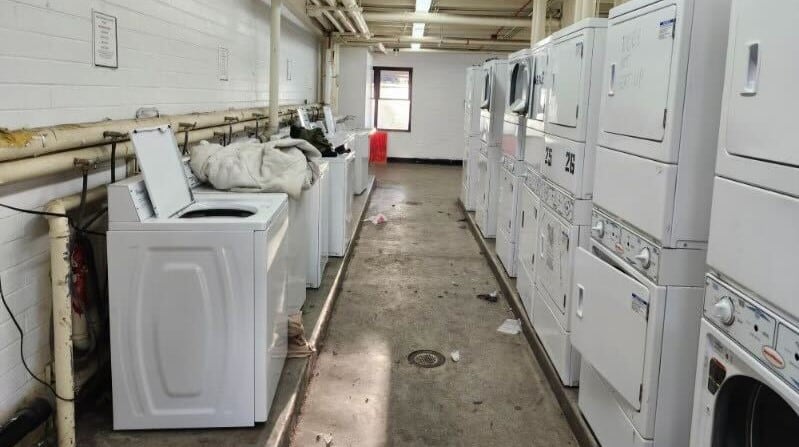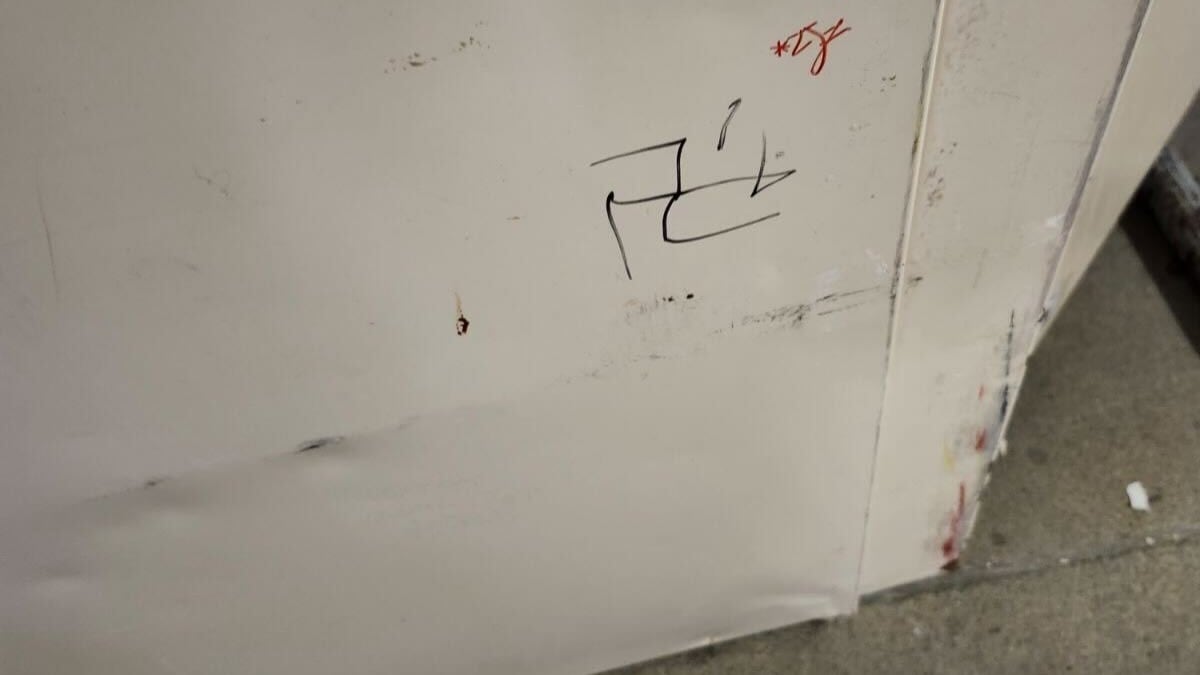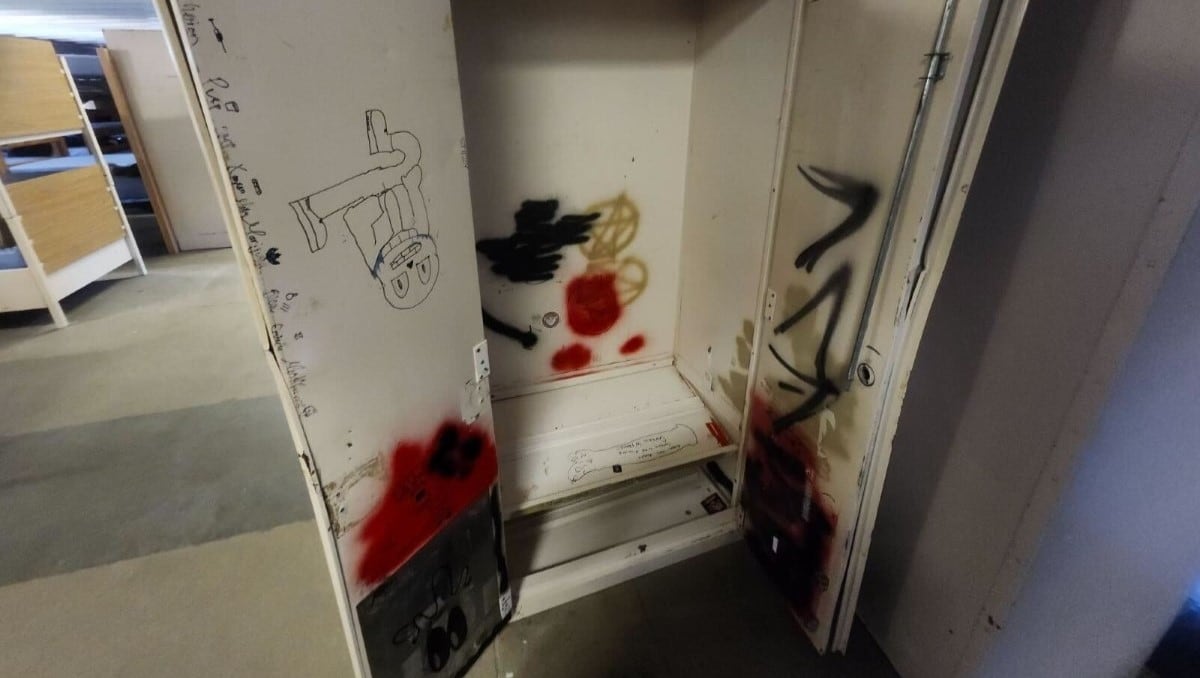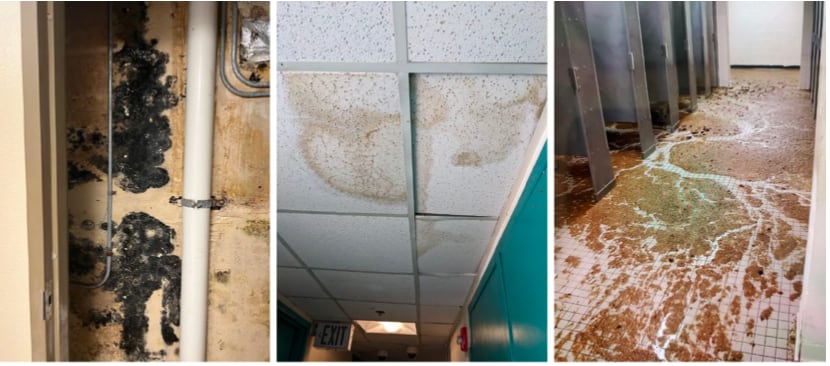A Marine company at an infantry school in California has been living in dilapidated and unsanitary quarters, recent photos reveal.
The photos, posted to Reddit on Sunday and provided to Marine Corps Times, purport to show dead vermin, possible mold and general disarray in a barracks building at Camp Pendleton’s School of Infantry-West.
Marines from the infantry school’s Lima Company have been living in the barracks for stints that sometimes last months, according to one Marine there.
In one image, a broken washing machine containing someone’s physical training gear sits full to the brim with dirty water. Half of the 16 washing machines in that same laundry room were broken as of Monday, the Marine said.

In another image, a rodent lies dead on the floor. Other photos depict large holes in the walls.
The photos also show a swastika scrawled on one wall locker, according to the Marine, who said that it has since been scribbled over.

Images of the facility were posted on Reddit and Hots&Cots, a Yelp-like app on which service members review their living and dining facilities.
Marine Corps Times asked the Marine Corps’ Training and Education Command on Monday about photos depicting the laundry room, the washing machine full of dirty water, the dead rodent, the swastika, and a shower curtain and section of a wall covered in black splotches.
Maj. Joshua Pena, a spokesman for that command, said in a statement Wednesday that while the school couldn’t confirm the accuracy of each photo because of the “limited visual context of some of the photos,” the school did find issues in the barracks after Marine Corps Times started asking questions and is working to fix them.
Pena added that “there is no excuse for the conditions depicted, and we take full responsibility for our barracks.”
“The health and safety of our Marines is of the highest priority,” he said.
The infantry school conducted a full walkthrough of its facilities to track down the contents of the images and to make sure it was on top of maintenance requests and cleanliness standards, Pena said.
“The walkthrough did reveal the need for some remediation to include additional cleaning of hygiene facilities and the input of additional maintenance requests which have been remediated within 24 hours of the query submission,” Pena said.
The living conditions at the infantry school prompted Lt. Gen. Kevin Iiams, the commanding general of Training and Education Command, to plan to inspect the barracks himself next week, Pena said.

It’s unclear how, exactly, the conditions in the Lima Company barracks got to this point.
The school has a standard end-of-weekend cleaning regimen, Pena said, “which includes the cleaning of showers, laundry facilities, common areas, squad bays and the application of mold/mildew mitigation, to include shower curtain replacement.”
To keep vermin in check, the school has pest control contractors constantly operating, Pena said. Marines aren’t allowed to have food in their living quarters and must report pests they see to their building managers as well.
Marines can submit repair requests through an electronic system. Response time varies based on the severity of the issue and the availability of technicians and repair parts, according to Pena.
The Marine Corps has “zero tolerance” for vandalism of government property, whether inside or outside barracks, said Pena, who urged Marines to report vandalism or other issues to their leaders.
“The care and maintenance of our facilities is a collective effort for both the leaders and occupants,” the spokesman said.
The school of infantry is one of two where Marines fresh out of boot camp receive either basic infantry training or, if they are entering infantry jobs, more specialized preparation.
Marines at School of Infantry-West may spend time in Lima Company if they have medical or legal issues, or are awaiting training or new assignments, according to Pena. Some Marines have to stay there for months, the Marine in the company said.
The company has a reputation as an unpleasant purgatory, according to the Marine.
Barracks woes
The Marine Corps isn’t the only service that has faced criticism for providing subpar living conditions to the junior-enlisted ranks.
A government watchdog report in September found widespread deficiencies with the military’s barracks, including mold, faulty plumbing, and inadequate heating and cooling, prompting outrage by federal lawmakers.
RELATED

Mold has been an especially frequent problem, cropping up in hurricane-battered Marine facilities in North Carolina, Army barracks further inland in the state, and privatized Air Force housing in Washington and Texas, to name a few examples.
Marine leaders have said they are aware the service’s aging barracks may make it harder to retain Marines.
The Marine Corps is working on an initiative called Barracks 2030 to improve its living facilities, according to an internal memo obtained by Marine Corps Times.
Marine leaders have decided to hire civilians to keep tabs on barracks beginning in Fiscal Year 2024 or 2025, rather than relying on Marines as barracks managers, according to the memo.
By the fall, the Corps plans to put in place resident advisors who can serve as leaders in the barracks, and on-site maintenance teams who can fix issues and conduct annual renovations as needed. Pilot versions of these programs are already happening at Marine Corps Air Station Miramar, California, according to the memo.
When there is funding available, the Marine Corps will buy new furniture and update washers and dryers, the memo says. It will repair or replace all faulty door locks “immediately.”
The Marine Corps plans to seek more funding from Congress for its barracks, Marine leaders have previously said. The service currently spends an average of $300 million a year on barracks, but it needs closer to $1.5 billion a year to improve the barracks, according to the memo.
Gen. Eric Smith, the Marine commandant, said in October it would take about a decade for the service to fix its barracks problems. But he committed to making what improvements he could during his four-year term at the helm of the Corps.
“We want our Marines to be taken care of,” Smith said. “It’s a safety issue.”
Irene Loewenson is a staff reporter for Marine Corps Times. She joined Military Times as an editorial fellow in August 2022. She is a graduate of Williams College, where she was the editor-in-chief of the student newspaper.





